But are `friends' electric?
Only mine's broke down
And now i've no one to love.
-- Gary Numan

| Musicfolio.com | Reviews & Recommendations |
| You know i hate to ask But are `friends' electric? Only mine's broke down And now i've no one to love. -- Gary Numan |
Gary Numan |
 |
|
|
|
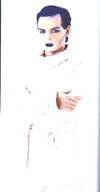 "In early 1979, the UK success of
Gary Numan's second album Replicas and the single Are 'Friends'
Electric? made the charts safe for a generation of synth-pop artists
including the Human League,
Depeche Mode, and Orchestral
Manoeuvres in the Dark. "In early 1979, the UK success of
Gary Numan's second album Replicas and the single Are 'Friends'
Electric? made the charts safe for a generation of synth-pop artists
including the Human League,
Depeche Mode, and Orchestral
Manoeuvres in the Dark.Under the influence of Roxy Music, Kraftwerk, David Bowie, and Brian Eno, Numan fashioned an original brand of austere, robotic, hypnotic electronica that would have a lasting effect on the musical landscape both at home and abroad. Nowadays, Gary Numan's influence is perhaps as far-reaching as that of the performers who initially inspired his own work. From Detroit techno pioneer Juan Atkins to the likes of Marilyn Manson, Beck, the Smashing Pumpkins, the Prodigy and Trent Reznor, numerous contemporary artists have acknowledged Numan's role in their musical formation."
-- Wilson Neate, popmatters.com
"When Gary Numan released the hit single Cars in 1979, he was considered a New Wave freak. There he was on the cover of his breakthrough album, 'The Pleasure Principle', wearing eye shadow, an earring and a fancy suit and tie. Rather than bitch about the world and play guitar, Numan obsessed about technology and played synthesizers. He was a New Romantic with a vision. And in hindsight, he was pretty darn ahead of his time."
-- James Cury, BAM magazine, 5/97
1978: Tubeway Army Self-titled debut album of Gary Numan's original electro-punk band. 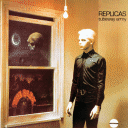 "It wasn't until this album and its accompanying singles sold by the boatload that Gary was able to step out from the shelter of a group name and release The Pleasure Principle under his own name. Make no mistake though, Tubeway Army and Gary Numan were synonymous. The band didn't change, only the name. Replicas wasn't the first though - the relatively obscure Tubeway Army came first. (...) May 1979, and Are 'Friends' Electric? finds Numan at number one. While he wasn't the first to use synthesizers in pop by any means, and his image certainly owed something to such predecessors as David Bowie and John Foxx, Numan was the first popular artist to be associated specifically with the synthesizer. (...) This disc and The Pleasure Principle form, for me at least, the essential core of any Gary Numan collection. "
-- Al's Review archive, archive.awrc.com
"The Pleasure Principle, Numan's first release under his own name, contains the international hit Cars and continued Numan's maturing love affair with the synthesizer. His interest in technology showed itself to be increasing in both the lyrics and the music. (...) Pleasure Principle was the vanguard of the future... "
-- Steven Grant/Ira Robbins, trouserpress.com
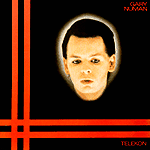 "A progenitor and imaginative practitioner of the Moog synthesizer, Numan employs both a mini-Moog and poly-Moog on Telekon, but unlike most of his contemporaries, Numan advanced his use of the synthesizer beyond mere showy, mindless electronic frippery. (...) The stark delicacy of Please Push No More features nothing more than Numan's robo-vox accompanied by soft Moog lines seeping over a deceptively simple piano arrangement. There's also an alternate take of the classic I Die, You Die, and an acoustic piano rendering of Down In the Park. Lastly, we come upon the gentle Tres Gymnopedes, one of the most melodious piano/ synth compositions you'll find anywhere this side of Planet Eno. True, the kitschy, early '80s starman exterior invited many critical misconstructions that Numan was just some insubstantial, image- conscious neo-Trekkie. Yet, under all the otherworldly pomp surrounding Numan's public image, there lingers plenty of pure, sincere artistry. "
-- Michael Sandlin, pitchforkmedia.com
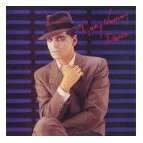 1981:
Dance 1981:
Dance"From the first few seconds of evocative opener, Slow Car To China (a title adapted from W.S. Burroughs' Dead Fingers Talking), we are presented with the essence of 1981's Dance. A gliding fretless bass lazily augments the slow tempo and subtly funky CompuRhythm- an early drum machine and component of the Numan sound, 79 to 83- as mistily echoing synths make themselves heard. A key aspect of this album is percussion; electronic, acoustic, metal or wood, whilst distant sounds fill the ambiguous mise en scene with ghost-like atmospherics. Dance has more in line with the Krautrock acts of the 70's than the clean cut synth exploiters that had become common place by this period. Tones rise and fall as Numan recites his whimsical poems with a greater capacity for vocal dynamism; from murmur to scream. The artist swaps the awed, monolithic sound of his previous release, 'Telekon', for a more free flowing, seemingly less measured approach to sound and vocal dynamics. Cry The Clock Said is a vast space of sounds that enter and withdraw with a beauty that is almost unsettling. As the drum machines lay down a rhythm that sounds more human than mechanical an effected violin (played by Canadian alternative artist, Nash The Slash) helps an almost random sequenced synth to fill the void. The piece is just under ten minutes long but time is made purposefully irrelevant as Numan exchanges between an arch nasal lament to gentle utterances that display the usual disturbed melancholia in new, airily minimal circumstances. The digital Linn Drum sound is utilised on Night Talk- another percussive medium explored whilst Numan proves himself to be a skilled bass player. The first four tracks in particular are built from slow building atmospheres and dark edged sadness, but the quiet is disrupted by the more danceable She's Got Claws (a no. 6 hit and Afrika Bambatta favourite). A flamboyant and odd song that makes bitter attacks on the press who hated him: 'Laughing hyenas/ pens for charm' Stories is a beautiful semi ballad which recounts a narrative of revelation in a graceful blend of precise bass lines, distinctly odd synthesizer and rolling piano accompanied by the sharp beats of the CR78. My Brother's Time is a pendulum driven song led by what sounds like an aged bar room piano allowing Numan to muse over recent troubling events in his unusual life only to settle into serenity and detachment with the line 'We could dance' which precedes a haunting saxophone solo displaying the instruments ability for creation of atmosphere. You Are, You Are is an aggressive rush, like Crash that brings us back to earth with a mass of cascading Tom-Toms (played by Queen's Roger Taylor) and searing guitar, violin and a motorik groove doubled by a clap trap (another percussive device). The album's closer, Moral opens with more Toms and a heavy guitar part as the beat is slowed to a menacing stomp. Here Numan berates current fashions, 'These new romantics are oh so boring..' whilst recounting more examples of hypocrisy and sleaze. The rant ends with a burst of up tempo aggression in a haze of screeching synth, strings, guitar and vox. Numan, a post modernist to the extreme, enfolded this strange album in an image of juxtaposition; a be-suited, fedora wearing, ghostly persona sitting before a wall of purple neon tubes that says much about the content. An outlandish space of bizarre and inspiring images and sounds from the past, future and somewhere in between. "
-- Matthew Ibbs, for musicfolio.com, 4/03
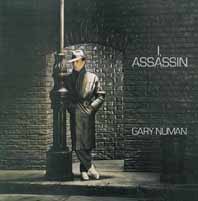 "So what we have on a lot of these tracks is Numan sounding somewhat like David Sylvian, while the backing tracks sound like iffy outtakes from Sylvian's innovative art rock band Japan. Problem is most of these tracks just aren't very interesting and even fewer are vaguely close to memorable, especially with all the sad-ass sax playing and occasional harmonica. The one track [ ] that brought me back for more was We Take Mystery To Bed from 'I, Assassin', which contained a couple of elements missing from most of the other stuff: fun and joy."
-- Stephen Sheehan, lazy-i.com
"Subsequently stumped for a way to revive his flagging career, Numan made the roundly dismissed, almost laughable Warriors."
-- Steven Grant/Ira Robbins, trouserpress.com
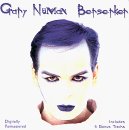 1984:
Berserker 1984:
Berserker
"With Berserker, a world of big, driving, precision sounds is uncovered as Numan gradually discloses a story of an individual being hunted by a series of nightmarish personas. The tone is one of typically oblique and detached menace, the concept revolves around associations of the word 'cold' - icily made flesh in one of the artist's most extreme images- that of the blue haired, white faced figure which is well representative of the chilly, effervescent synths boosted by sequenced rhythms and heavy grooves. This album saw the man seeking out more new sounds with the aid of recent developments in synthesis. A renewed vigour and arrogance is carried through - this was his first LP on self finance Numa Records- with a new sense of excitement and positivity that was quickly to become replaced by a jaded and isolated sense of desperation. The title track is an efficient, cold blooded introduction with spiralling guitar, pounding beats, pushy, sampled slap bass and an unusual use of female vocals greatly at odds with his (then) peers. My Dying Machine is arguably one of the most forward looking. A heavily sequenced, hard line dance floor epic about the detached thoughts of someone facing death inside a failing machine. The questions we ask when faced with desperate circumstance and intense fear play a significant part in the lyrics of this long player, allowing Numan to call in to question the belief in God, a matter continued in Cold Warning, A Child With The Ghost (a spectral and touching tribute to Paul Gardiner, his band mate and friend since the days of Tubeway Army, who died that year), and The God Film, a slick and punchy shard of off -the- wall technologically enhanced funk that also takes a shot at the evils of a hypocritical and immoral society with cutting synth drones and machine gun drumming which, like The Secret presents Numan's new fascination with the possibilities of sampling, explored in admirable depth on this 1984 effort. Another highlight, Cold Warning opens with a haunting viola hook resonating in quasi eastern tones whilst an all encompassing, booming synth lets in a powerful breakbeat accompanied with the aggressive bass playing that permeates the whole LP. A cold semi- mystical electronic fusion album that defies definition with a lust for noise. Because of Numan's ardour, self determination and love of new and blended sounds, Berserker, like most of his others, has aged very well and still impresses."
-- Matthew Ibbs, for musicfolio.com, 4/03
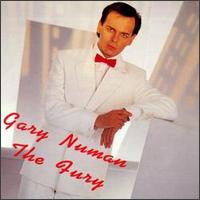 "This is a fairly good mid-80s effort from Numan, originally released on his own Numa label after his commercial star had burned out. Songs like Call Out the Dogs reflect Numan's rage towards the fickle music business and scathing critics, while God Only Knows and Miracles play the loneliness card so bleakly even Morrisey might take notice. Numan homegrown production sound is weak, but there's good songwriting here if you look for it."
-- mw66, via rollingstone.com reviews, 2/01
"It is rich in digital electronics and haunting. One of the elements contributing to its greatness is the diversity of tracks on the album. It opens with one of the best Numan songs ever, My Breathing, an irresistable driving new wave tune complete with arabian style strings. Nearly as infectious is the title track. The Sleeproom is one of the darkest tunes you'll ever hear, while New Thing From Londontown gets you dancin'."
-- amazon music fan from Calgary, AB
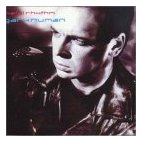 1988:
Metal Rhythm 1988:
Metal Rhythm
Like every other Numan album you've heard, Metal Rhythm isn't easy listening. Brutality and aggression rule here in spite of the apparent sparseness of the sounds. The truncated 'metal hits' that form the basis of this lp's percussion are empowered by the familiarly raw blast of power chords which add to the satisfyingly aggressive hostility of the various states Numan describes here. Subjects range from drug use, depravity and the super natural; -the Incubus described in The Hunger, perhaps a metaphor for the AIDS virus-, desperation and rage; Cold Metal Rhythm, New Anger; Prince-ified decadence- Young Heart and Devious, in particular. The latter opens the American version of the album with a toppling drum loop, slick guitar and fizzing flamboyant digital synths before relating a (true) tale of kiss and tell. Voix is another scathing attack on hypocrisy and cowardice, on the part of numerous enemies, no doubt, that allows the metallic clinks to take front seat for a slow building space inhabited by howling synth pads that work with the oddly executed female backing vocals to produce something that otherwise might've been a ballad. Funk guitar is most prominent on opening track, This Is Emotion; an aspect of human existence that has always troubled the artist. The heavy and purposefully simplistic drum sounds highlight the albums inspiringly ambiguous definition; Rock/funk/light Industrial/electro fusion is the best I can do. The final track, Don't Call My Name shows the gentler side of sampling, presenting Numan's penchant for melancholy in song with a very efficient, sweet and lightly percussive ballad expanded by murky synths and slight fretless bass that would've worked well on 'Twin Peaks'. Bonus track, I Don't Believe (originally B-side to New Anger) is a glorious anthem to disenchantment, turning negativity into a positive with it's dance groove, punchy slap bass, and ethereal arrpegiated synths- a throw back to 1980's I Die:You Die . This album has dated, but only marginally, as the star adhered to the late eighties digital sound, at times, perhaps, a little too closely, but the stark power and bitterly uncompromising attitude still provide an unusual alternative to the bloated pomp rock doing the rounds at the time. Consistently popular with the fan base- in '98, Voix was re recorded to acknowledge the LP's tenth anniversary and remains a component of Numan's more recent live set. A good, solid and enjoyable album.
-- Matthew Ibbs, for musicfolio.com, 6/03
1990: Outland just click here! to send us your review of this album 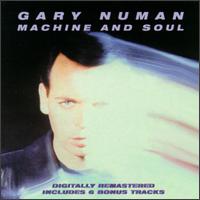 1992:
Machine and Soul 1992:
Machine and Soul
"If there was ever a point where the sometimes too-insular-for-his-own-good Numan couldn't have been more out of sight, out of mind — even to his central fanbase — the often-bizarre Machine + Soul is it. (...) The album was admittedly recorded in somewhat dire circumstances for Numan, facing a crushing debt and trying to create something for commercial success first and foremost. (...) Perhaps the most jawdropping effort was a cover of Prince's brilliant duet with Sheena Easton, U Got the Look, arguably single-handedly responsible for Prince wanting to change his name in sheer terror at the result."
-- Ned Raggett
1994: Sacrifice "Sacrifice has now become legendary amongst fans as the album that marked Numan's confident return to his 'roots' as progenitor of dark, groove orientated electronic music. With aggressive sampled sounds, storming break beats, mantric vocals and ethereal piano/synth lines which display with ease his skill and ear for an often startling melody. This album, swathed in black and silver, also saw the further reintroduction of the original Tubeway Army guitar sound; booming power chords and tight rhythm chops. Highlights include the sublime 'Deadliner'. A narrative about a drug induced real life nightmare is relayed over a ream of loops sounding like an army of demons- complete with growls- and a striking synth/piano melody which resonates with all the panache of a deeply sophisticated horror film score. 'A Question of Faith' is an intensely aggressive and uncompromising attack on blind belief which pounds the ears with its mechanic groove . The general atmosphere is one of burgeoning, other worldy atmospherics (in particular the distinctively trippy 'Bleed') brought to ground shaking earth by an impressive rhythmic style. Final track, 'The Seed of A Lie' is a genuinely affecting and powerful lament which again displays Numan's oblique but often fascinating story telling abilities. This is undoubtedly one of the man's finest- an efficient, well packaged monolith of an album that banished the insecurities of his mid eighties output."
-- Matthew Ibbs, for musicfolio.com, 4/03
1997: Premiere Hits "Premiere Hits is a timely repackaging of some of Numan's greatest work. Unfortunately remembered by the mainstream for his robotic, nasal drone on Cars, this collection provides a history lesson to the uninitiated. There was something almost melancholic behind the icy isolation of Down in the Park, Are Friends Electric? and We Are Glass. Numan's melodic sensibilities were essentially minimal, but it fit his aesthetic perfectly. Songs like When I Die You Die have a sweeping grandeur to them, nonetheless, and earlier works like Bombers have an aggressive punk edge."
-- Steve Gdula , amazon.com
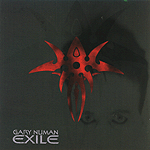 "On this, his first notable solo album in years, Gary Numan spirals down a rather demonic goth, spiritual black hole. Exile is comprised of gloom-n-doom hymns for the coming millennium, and possibly, the end of existence itself. It's all incredibly minimal: sampled flecks of sound, programmed bass and drum tracks, with light synthesizer and some occasional treated guitar overlay. Yet the album's narrow breadth, both lyrically and compositionally, is ultimately a hindrance. (...) In fact, much of the instrumentation hearkens back to early Depeche Mode, as well as the forerunners of ethereal gothcore repetition, the Cocteau Twins. Dominion Day opens with the menacing prickle of metallic guitars as Numan laments the universe's inevitable surrender to the hands of evil forces. (...) Musically, it's a bold, yet somewhat failed experiment in repetitious extremes. If you were, however, given warm fuzzies by albums such as the Cure's wrist-slashing masterpiece Pornography, you may find Numan's Exile tolerable."
-- Michael Sandlin, pitchforkmedia.com
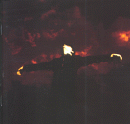 "Influential industrialist at last justifies his reputation. His fans include Marilyn Manson and Fear Factory. And yet, 'Pure' is the first time Numan has faced his lauded admirers on equal terms. This veteran artist (his debut is 22 years old!) has released a superbly dark and dysfunctional industrial album that will electrocute you. My Jesusand Rip are just two of many tracks that spiral with synth-based dementia before immersing you in elegant waves of distortion. If you like your melancholia dense and dynamic, you won't want 'Pure' to end. And no way will you believe it's a Gary Numan album. Venturing into darker pastures than Depeche Mode dared, 'Pure' lives out a post-modern nightmare of 'Blade Runner' fashioned alienation. It would be selling Numan short to call 'Pure' pregnant with menace. This damn thing is overdue."
-- Kerrang music magazine
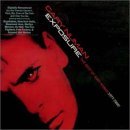 "Being the prolific artist he is, with 16 studio albums released between 1978 and 2000, Gary Numan's extensive discography, from a certain perspective, works against him. Considering that he hasn't been the most consistent electro-pop artist in the late 80s and the 90s, even loyal fans came close to loosing faith in his output as he became stuck in a repetitive cliched synth-based sound that has become his signature. In order to experience the brilliance of Numan's musical genius that influenced a whole generation, compilation albums of his best tracks are most recommended. Exposure is a collection of hits and 'best-of' tracks, including everything from his early chart topping Cars and Are Friends Electric? to his latest dark and industrial offerings on 'Pure', and stands as the perfect musicfolio for the ultimate newwave icon that Gary Numan has become."
-- Said Sukkarieh, musicfolio.com, 1/03
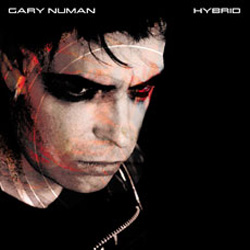 2CDs of industrial and dark remixes of some of Numan's greatest hits by metal act Sulpher (Rob Holliday & Monti), DJ Andy Gray, Flood (producer of Depeche Mode, U2, Nick Cave), Curve and others. Includes three new tracks: Hybrid, Crazier,and Ancients. "Dark, powerdriven music with a rage notably missing from the sterile, clinical synth beats that made his name. Opening with the unreleased title track, which sounds like the sort of crunching industrialised music normally playing in the background to a David Fincher flick, the two CDs represent an interesting, 2003 filtered view of his career. Nowhere is this most notable than on two of his most famous tracks. Classic electronica Cars now becomes a slow cyberpunk-cum-orchestra mood piece, while Are Friends Electric? – recently sampled by the Sugababes – adds a layer of thundering bass and grunge stylings to the original production. The effect is unique. Numan’s occasionally whining, atonal voice now seems perfectly in place surrounded by the wall of static and sound that accompanies him. An unlikely, but successful, mix – part 80s Numan part Trent Reznor, and an impressive hybrid experiment indeed."
-- manchesteronline.co.uk, 2/03
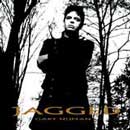 Tracklisting : 01. Pressure 02. Fold 03. Halo 04. Slave 05. In A Dark Place 06. Haunted 07. Blind 08. Before You Hate It 09. Melt 10. Scanner 11. Jagged "In a very strange twist, these days Gary Numan is taking influence from the very bands he influenced with his late seventies and early eighties recordings. Most noticeable is Nine Inch Nails (whose recently departed drummer Jerome Dillon appears on two tracks on Jagged). When you come to think about this in detail, the whole situation becomes very confusing. It’s almost as if Numan has filtered himself through many of his more famous fans to create a version of his music more pure than when he began. In fact, if he sounds like the bands he himself influenced, is this anything more than a simple progression of his own style with no outside influence at all? (...) The darkness in Numan’s music is more obvious these days, what with the crunching guitars, thunderous drums (both live and programmed) and the overall industrial production treatment but the one all important thing that he hasn’t lost is the hooks in his songs. Okay, he can’t put things out masquerading as pop anymore but maybe that’s a good thing - just check out the chorus on Blind if you’re unsure. At first glance you may be forgiven for thinking Gary Numan now shows no trace of the man he was in his heyday. He would probably claim this to be true himself. In fact, he is every bit that man still, having lost none of his talent and remaining, thankfully, very much the outsider."
-- Andy, IndigoFlow.co.uk, 3/06
Tracklisting : 1. Resurrection 2. Big Noise Transmission 3. Dead Sun Rising 4. When The Sky Bleeds He Will Come 5. For The Rest Of My Life 6. Not The Love We Dream Of 7. The Fall 8. We Are The Lost 9. For The Rest Of My Life (Reprise) 10. Into Battle 11. Not The Love We Dream Of (Piano Version) "Surprisingly – or not quite – Numan sounds a little bit Reznor-ish, the blueprint of Nine Inch Nails are present all over the album and the (good) student have now some influence on his master, but all those elements are melt into the typical Numan’s constructions and sounds. Five years after the brilliant 'Jagged', on 'Dead Son Rising' Numan collaborate with the same Ade Fenton – producer and co-written. The title track is a reworked version of “What Have I Become” and “We Are The Lost” is a reworked version of “Mercy” and both are from the 2006 “Jagged” sessions, “For The Rest Of My Life” is a reworked version of “Always” and “The Fall” is a reworked version of “Look”, both from the 2000 “Pure” sessions. “Big Noise Transmission” was previously played live under the working title “Captured Underground Noise Transmission” and “Zulu” while “When The Sky Bleeds, He Will Come” had the live working title of “Dragging Loop”. This time Numan and Fenton find a fine balance between intensity and gloomy experimental sounds and passages, between cinematic and anthematic moments and themes. In spirit, “Dead Son Rising” might be related to Nine Inch Nails “Fragile”.
-- brushvox.com, 9/11
|
______ |
Charts | Lyrics/Poetry | Links | Contact Us | Advertising Copyright © 1999-2012 - musicfolio.com - All Rights Reserved |